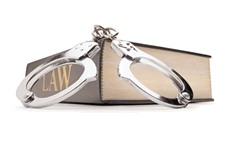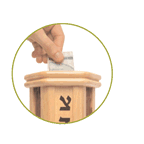THINGS YOU
NEED TO KNOW

Are all prisons in America guided from one general office?
There are all kinds of prisons in America. Most Jews in America find themselves in the Federal Bureau of Prisons (BOP). Each state has its own state prisons, under a state Commissioner. Then there are county jails, in which sheriffs are in charge. America also has Homeland Immigration prisons and US Marshal prisons, from amongst the more known prisons.
Prisons, be they federal, or state, each separately has its own set of rules on what a person entering the system is allowed to bring with him from the outside. For Jews who want to bring religious books and/or articles, again, each state and/or county and also each federal prison has rules on what is allowed.
Can I send a prisoner clothing or money?
Clothing cannot be sent to federal (BOP) prisoners. The prisoners are allowed to purchase clothing from the commissary.
Most State prisons do allow for clothing to be sent to prisoners.
Cash is not to be sent to any prisoner, as it may get lost. In almost all prisons, state, city, county and the federal system, a Postal Money Order is the best way to send money. Each state has rules on how to send it. For federal prisoners, it is sent to a specific address and the Postal Money Order is made out to the name and number of the prisoner, also mentioning his location.
Can I send medicine?
Medicine cannot be sent to prisoners in the federal (BOP) prisons. An over the counter medicine can be purchased out of the commissary.
For State prisons, it is best to inquire about sending medicines, as each state has another policy.
Can I send medicine?
Medicine cannot be sent to prisoners in the federal (BOP) prisons. An over the counter medicine can be purchased out of the commissary.
For State prisons, it is best to inquire about sending medicines, as each state has another policy.
Can I send personal care products?
In general, various prisons have various regulations and it is best to check.
Can I write a letter? Are my letters private?
Nothing is private regarding a prisoner. Prisons have the right, and in fact do, read letters for various reasons.
Is there anti-Semitism in prisons?
As Jews we must understand that we are not always understood. In addition, some staff may have heard all kinds of foolishness about Jews. Plus, there are prisons that have never had real Jews and may be ignorant of the laws.
Reaching Out helps any Jew, man or woman who reaches out for our help in these areas. At times prisoners are made to be afraid to report any anti-Semitism, for fear of retaliation. There is nothing to be afraid of once filing an official complaint and notifying Reaching Out.
What can Reaching Out do besides assist with religious problems?
Reaching Out can help with almost anything an inmate requires. Sometimes it is lack of medical care, or being treated unfairly. Sometimes it can be, being in a cell with someone rude, or staff mistreating an inmate. Reaching Out has contacts in the highest offices of prison administrations and is proud to say that we represent the Jewish prisoners in anything that may make a prisoner uncomfortable.
Each week, Reaching Out responds to approximately 250-350 letters from Jewish inmates around the country. We also receive about 50-100 letters a week from non-Jewish prisoners; some are already keeping the Seven Noahide Laws. We are constantly improving the programs that serve the spiritual needs of Jews in prisons and their families. We respond to every single letter that arrives and we do not charge anything for what we do. For some men and women in prison, our letter is the only letter they get from the outside world.
Most letters are from people in need. “The Chapel was closed for the Sabbath” or “The chaplain forgot to provide us with the grape juice” or “The Lt came into the middle of services and threw the Jewish community out,” or, “The food was not kosher even though they gave the impression that it is” and so many other issues. We also address medical problems when brought to our attention, discrimination and old-fashioned hatred issues.
What can I do to help the work of Reaching Out and to help a Jewish prisoner?
The biggest mitzvah (good deed) for an outsider is when you help an insider. By supporting us in helping those that can't help themselves, you are providing the highest level of the mitzvah of charity. It isn't only prisoners that the money goes to; what about the wife who was left without a husband and has no food for the children at her table? What about a sick parent who doesn't have her son at her side for a few years? What about the Jew who comes out of prison and has no home and needs help till he finds work? What about the Jew still in prison who has no funds to purchase warm clothing for the winter months?
The list is very long and we wish we could address every single request. With your help we may be able to. We are experienced in what we do and when you help us you help those that need it most.
Summation: Of course, we would prefer that Reaching Out did not have to exist in the first place. In a perfect world, with the revelation of Moshiach, there would be no need for prisons and no need for our services. G-d willing, this day will arrive very soon, as the Lubavitcher Rebbe has prophesized that our generation will be the last in exile and merit to be the first in redemption. May we see this NOW!
Do prisons provide kosher food?
Most state prisons, thanks to the tireless work of Reaching Out over many years, now serve kosher food. Although even for those that serve it, there remains much to do in order to improve the meals.
The Federal prison system provides hot kosher meals six days a week. There are various reasons in which chaplains can remove Jews from their meals for a few weeks to many months.
The staff of Reaching Out are busy each day of the week addressing kosher food problems in all kinds of prisons across America.
Can I send food to a prisoner?
Federal prisons do not allow any shipped food but most state prisons allow it.
Are the Sabbath and Jewish Holidays observed?
The Sabbath and Jewish holidays in prison are very different from the typical celebrations that take place at home. Inmates are at the scheduling mercy of prison officials and must wade through a quagmire of prison bureaucracy for the authorization to observe even the most basic Sabbath and holiday rituals.
The expert team of Reaching Out works with government and prison officials to make sure Jews can observe the sanctity of the Sabbath and holidays. We explain and emphasize the religious requirements of Jews, and provide assistance to prison wardens and chaplains to facilitate Jewish holiday services and programs.
Most prisons allow the men to light the Sabbath candles on Friday before sunset. That goes also for Chanukah. At some state prisons and in most county prisons, they still think very backwards. They refuse to allow Jews to light candles. When Jewish prisoners bring these issues to Reaching Out, we address them.
What about specific holidays, like Sukkoth and Passover?
Reaching Out makes sure that Prayer books for Rosh Hashanah and Yom Kippur, and honey packets, are shipped when asked.
Reaching Out helps prisons obtain Sukkoth for the Jewish men.
For Chanukah, we ship Chanukah Menorahs and candles.
Reaching Out works with Jewish chaplains and Chabad Rabbis across America to make sure all Jews hear the Megilah (Scroll) on Purim. We arrange to help Jews to give two food gifts, so that they can have the mitzvah of Mishloach Manot.
Money is not allowed in prisons, so Jewish men and women in prison are urged to send us stamps in lieu of Tzedakah (Matonos L'evyomin) that has to be given on Purim day.
For Passover Reaching Out helps chaplains obtain Shmura (handmade) matzah, and sends food packages to state prisoners and/or funds to poor prisoners so that they can obtain food from other sources.
Prison staff will never take the word of the prisoner, so when prisoners reach out to us, we will back them up and explain to authorities the religious requirements.
Do prisons provide a kipa and Talit?
For a Jew who knows how to put on Tefillin daily and how to pray with a Talit, it is best to bring your own set of Tefillin (not the most expensive) and Talit with yarmulke. Most prisons will allow these to be taken with you and kept in your cell so that you can use them daily. Of course, there are prisons that do not allow them. Some would allow them to be sent afterwards. It is best to call us ahead of time for advice.
Do prisons allow a prisoner to bring prayer books and/or other books?
Again, prisons have all kinds of rules regarding books. Some allow only soft-cover books; some allow just a few hard-cover books. It is best to be in touch with us for advice.
Do Jews have religious freedom in prison, and are they able to observe religion?
Less than 1.5% of the 2 million men and women in prison in the United States are Jewish. Every Jew has religious rights guaranteed by the U.S. Constitution. Despite the free exercise of religion clause in the First Amendment, many prison facilities still operate out of ignorance, some out of spitefulness (anti-Semitism) and incidents of religious abuse and anti-Semitism take place.
Reaching Out stands on the forefront in trying to educate religious freedom advocacy programs to ensure that inmates do not leave their First Amendment religious rights at the jailhouse door. When an inmate reports incidents of abuse or discloses policy problems, Reaching Out responds by reaching up to the highest offices of the state and federal prisons to make sure that they are in compliance with the Constitution and new federal laws that protect religious and humanitarian rights. Higher up in government offices are where cooler heads prevail, and they are very interested in having the prisons run within the law and not lawlessly.
We try to help Jewish prisoners practice their religion while in prison. We have always been in the forefront of pursuing strategies to assist institutions in fulfilling constitutional guarantees of religious freedom. We work to obtain kosher food, for religious requests are sometimes rebuffed, delayed in channels, or dismissed out of hand.
I have a friend in prison; can I go visit him?
Yes. You must have a current ID such as a driver's license or state ID. There are specific guidelines and specific rules and regulations regarding contacting a specific prison. One must make sure to abide by the rules. If a person has a pending or open case, or a bench warrant, one should be aware that he might be refused visitation privileges or subject to arrest at the time of the visit.
How often can family members visit?
There are set guidelines and each prison runs under a separate plan.
Can I make a telephone call to family and friends?
In general prisoners can make telephone calls, but again, each prison has specific rules.
Help a Jew in prison and press the Donate button now.




























